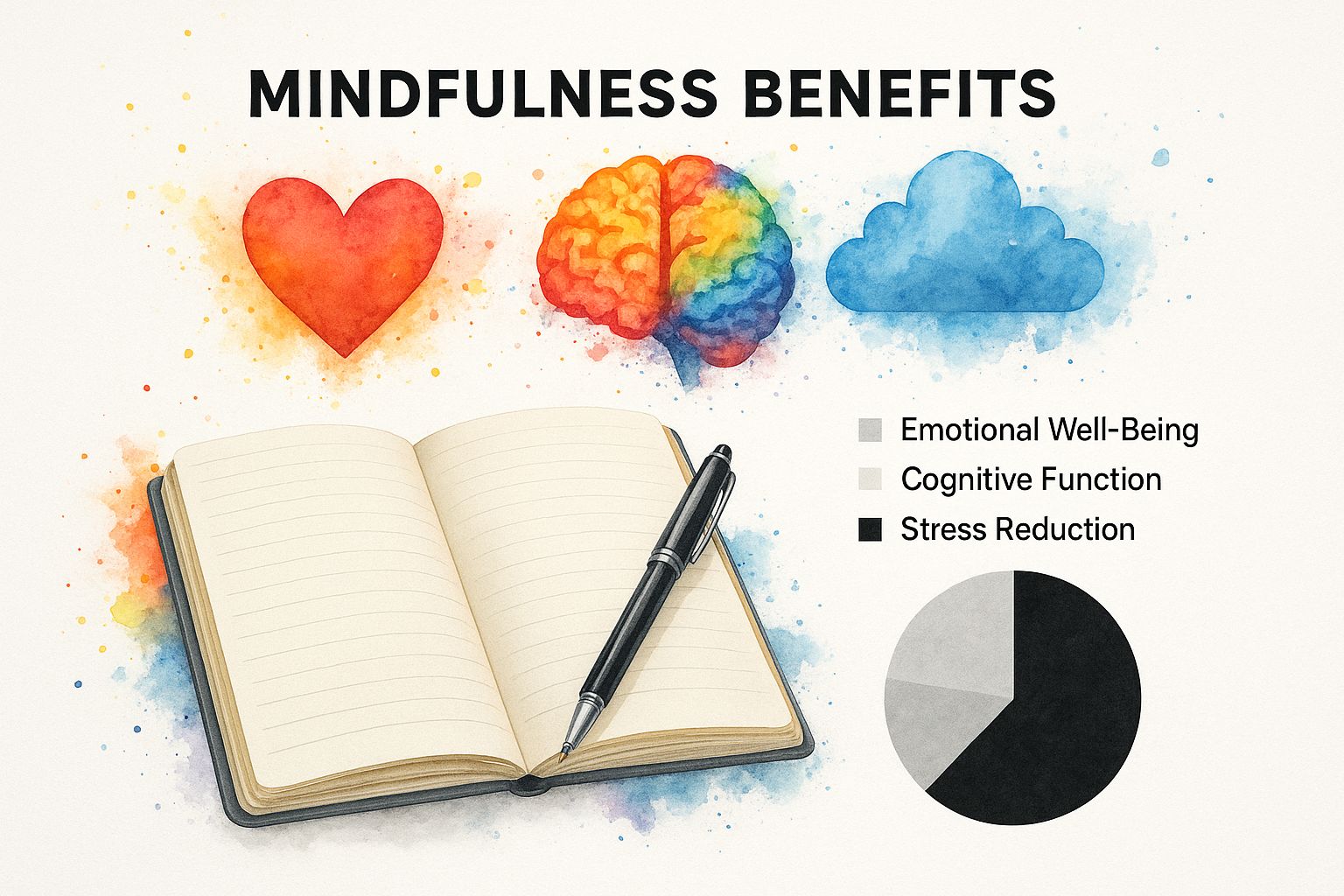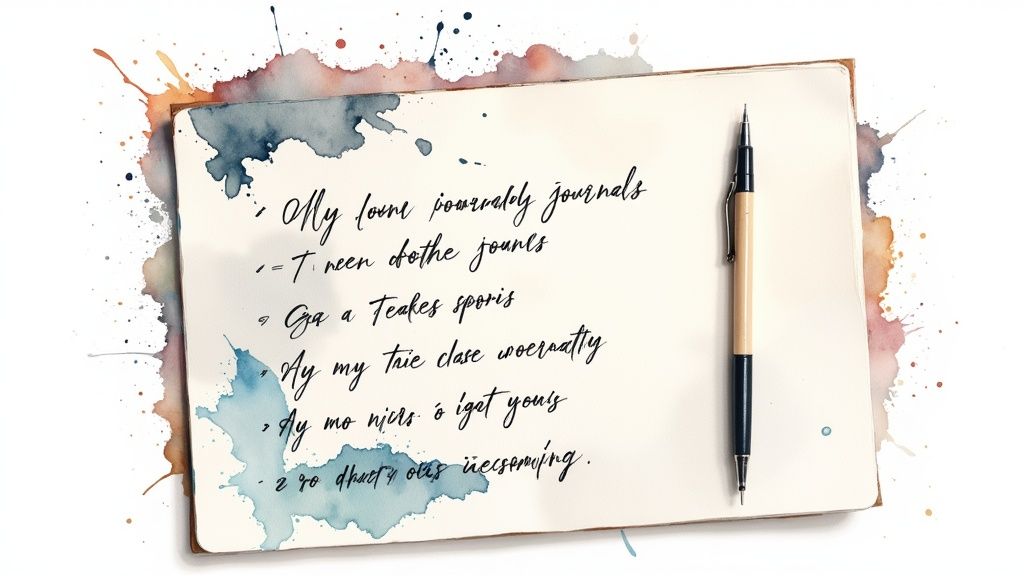How to Start Journaling for Mental Health: Tips & Guide

The Science Behind Journaling's Profound Mental Health Benefits
Journaling for mental health is more than just a daily record. It's a powerful tool grounded in neuroscience, capable of shifting perspectives and improving emotional regulation. This seemingly simple act can create tangible changes in how we perceive and manage our inner world.
How Putting Pen to Paper Impacts Your Brain
Transferring thoughts and emotions from internal experience to the written word creates cognitive distance. This separation allows for a more objective observation of thoughts and feelings, as if they belong to someone else. This new perspective lessens their potential to overwhelm.
Different journaling styles also activate specific neural pathways. Expressive writing, exploring deep thoughts and feelings, helps process complex emotions and traumatic experiences. This can lead to significant reductions in stress hormones and improvements in immune function. Gratitude journaling, on the other hand, strengthens neural circuits associated with positive emotions, fostering resilience and a more optimistic outlook.
Journaling's Measurable Impact on Mental Wellbeing
A 2022 meta-analysis of 20 studies across 31 mental health outcomes demonstrated the positive impact of journaling. The analysis revealed a statistically significant 5% average reduction in mental health symptom scores for journalers compared to control groups. Explore this topic further. Anxiety symptoms showed the most substantial improvement, with a 9% average decrease. This was followed by a 6% reduction in PTSD symptoms and a 2% improvement in depression symptoms. This evidence supports journaling as a low-cost and effective complement to traditional mental health therapies.
Tailoring Your Journaling Approach for Specific Needs
While the core benefits of journaling are widespread, certain approaches yield better results for specific challenges. For example, if you struggle with anxiety, focusing on identifying and challenging anxious thoughts in journal entries can be particularly helpful. This practice of cognitive reframing helps interrupt negative thought patterns and promote more balanced thinking.
For those processing past trauma, expressive writing offers a safe space to explore difficult emotions and experiences. This type of journaling facilitates emotional release and can contribute to a sense of closure.
The key is to find a journaling style that resonates with you and aligns with your mental health goals. Experiment with different approaches and observe their impact on your emotional well-being. This personalized approach allows you to harness the power of journaling to best support your individual journey toward mental wellness.
Finding Your Perfect Journaling Method: Digital vs. Paper
Choosing the right journaling method is a crucial first step toward reaping its mental health benefits. The medium you select—digital or traditional pen and paper—can significantly impact your journaling experience and, ultimately, your outcomes. This decision often comes down to personal preference, but understanding the strengths of each approach can empower you to make an informed choice aligned with your individual needs and objectives.
The Allure of Handwriting
Research suggests that the physical act of handwriting engages different parts of the brain compared to typing, leading to deeper memory encoding and enhanced creativity. The tactile satisfaction of putting pen to paper is a mindful process that can be deeply grounding. A physical journal also offers a distraction-free environment, unlike digital platforms with their potential for notifications and other interruptions.
The Power of Digital Platforms
Digital journaling, however, provides undeniable advantages in terms of searchability, security, and accessibility. Consider the need to revisit a specific entry from months ago: with a digital journal, a quick keyword search instantly locates it. Password protection and cloud storage ensure your thoughts remain private and secure. Meanwhile, accessibility from any device allows for journaling on the go, anytime, anywhere.

This infographic visually represents the intersection of journaling, mental health, and technology, highlighting the interplay between traditional and digital methods. The imagery suggests the emotional and cognitive benefits associated with journaling, such as improved mental clarity and emotional processing. This visual reinforces the idea that journaling can be a powerful tool for self-discovery and personal growth. A recent study revealed valuable insights into journaling preferences: 73.7% of participants favored traditional pen-and-paper methods, while digital journaling was used by only 15.8%. This strong preference for traditional methods highlights the enduring appeal of handwriting for self-reflection. Find more detailed statistics here.
To further analyze the differences between these two approaches, let's examine a detailed comparison:
To help illustrate the key differences between digital and traditional journaling, the following table provides a comparison across several key features:
Digital vs. Traditional Journaling Comparison This table compares the key attributes and benefits of digital journaling platforms versus traditional paper journaling methods.
| Feature | Traditional Paper Journaling | Digital Journaling |
|---|---|---|
| Privacy | Physically secured; potential for loss or damage | Password protected; potential for data breaches |
| Searchability | Manual review required | Keyword search functionality |
| Accessibility | Requires physical journal | Accessible from any device |
| Cost | Requires notebook and pen purchase | May require subscription fees |
| Creativity | Facilitates drawing and handwriting variations | Limited to typing and digital art tools |
| Distraction | Minimal distractions | Potential for digital distractions |
This comparison reveals that while traditional journaling offers a more tactile and distraction-free experience, digital journaling excels in searchability, security through backups, and convenient accessibility.
Finding Your Personal Fit
The most effective journaling method is the one you find most sustainable. Some individuals are drawn to the tactile experience of a physical journal, while others appreciate the convenience and features of digital platforms like Memoize, which offers AI-powered insights to deepen self-reflection. Experiment with both approaches to discover which one best resonates with your personality and supports your mental health journey.
Embracing a Hybrid Approach
Consider a hybrid approach, combining the strengths of both methods. You could primarily journal on paper, then use a digital platform to store and organize important entries. This strategy allows for flexibility, adapting your journaling practice to different contexts and emotional needs. This adaptable approach can prove particularly beneficial during periods of high stress or intense emotions.
Transformative Journaling Techniques That Actually Work
Beyond simply jotting down daily events, exploring evidence-based journaling methods can unlock substantial mental health benefits. These techniques offer structured approaches to leveraging the power of journaling for specific outcomes.
Gratitude Journaling: Cultivating a Positive Mindset
Gratitude journaling emphasizes acknowledging and appreciating the positive aspects of life. This practice redirects attention away from negative thought patterns and cultivates optimism. By consistently noting what you are thankful for, you can train your brain to focus on the good, building resilience and enhancing your overall mood. Begin by listing three things you appreciate each day, no matter how small they seem. This simple act can gradually shift your perspective over time.
Emotional Release Writing: Expressing and Processing Emotions
Emotional release writing provides a safe space to process difficult emotions and traumatic experiences. This technique involves writing freely about your feelings without censorship. The objective is not to analyze or solve problems, but to express and release pent-up emotions. This practice can help reduce emotional distress and promote healing. It's similar to decluttering your mind, creating room for clearer thinking and emotional regulation.
Cognitive Reframing: Challenging Negative Thoughts
Cognitive reframing uses journaling to identify and challenge negative or distorted thoughts. By recording these thoughts and objectively analyzing them, you can begin to reframe them in a more balanced and realistic light. For instance, if you think "I'm a failure," counter this thought by listing evidence that contradicts it. This technique empowers you to break free from negative thought patterns and encourages positive self-talk.
To further understand the various journaling techniques available, their implementation, and benefits, refer to the table below:
Evidence-Based Journaling Techniques
| Technique | Implementation Method | Target Mental Health Benefits | Recommended Frequency |
|---|---|---|---|
| Gratitude Journaling | List 3-5 things you are grateful for daily. | Increased positivity, improved mood, enhanced resilience. | Daily |
| Emotional Release Writing | Write freely about challenging emotions and experiences without censoring yourself. | Reduced emotional distress, facilitated healing, improved emotional regulation. | As needed |
| Cognitive Reframing | Identify and challenge negative thoughts by writing them down and analyzing them objectively. | Reduced negative thought patterns, improved self-talk, increased realistic thinking. | As needed |
This table summarizes various journaling techniques, offering a quick overview of their application and associated mental health benefits. It emphasizes the importance of choosing a technique that aligns with your specific needs and goals.
Real-World Application and Practical Advice
These techniques are not merely theoretical; they have helped many people achieve significant improvements in their mental health. A 12-week web-based Positive Affect Journaling (PAJ) intervention demonstrated substantial benefits for adults with medical conditions and elevated anxiety. Participants who completed 15-minute online journaling sessions three times a week saw improvements in psychological distress and quality of life. The study noted an average adherence rate of 66.4%, demonstrating the practicality of integrating journaling into busy schedules. Discover more insights about this study. It's also essential to address common obstacles like perfectionism. Remember, journaling is a personal journey, not a performance. Focus on the process, not the outcome, and write freely without judgment. Even short, imperfect entries can offer valuable self-awareness and enhance well-being.

Building a Journaling Habit That Actually Sticks
Starting a journal is often easier said than done. Life's demands can interrupt even our best intentions, motivation dwindles, and journaling can start to feel like just another item on the to-do list. However, consistent journaling is key to unlocking its benefits for mental well-being. How can you cultivate a journaling habit that truly endures?
Integrating Journaling Into Your Routine
Rather than treating journaling as a separate task, integrate it into your existing daily routines. This strategy, called habit stacking, connects a new habit to one that's already established. For example, journal immediately after your morning coffee, or just before you go to bed each night. This association creates a natural reminder, making the new habit easier to establish.
Starting Small With Minimum Viable Sessions
Don't pressure yourself to write pages at a time. Minimum viable sessions, as little as five minutes, are more effective than infrequent, lengthy entries. This approach eliminates the feeling of being overwhelmed and helps build momentum. Like developing any new skill, consistency is more important than intensity, especially at the beginning.
Designing Your Environment for Success
Your environment significantly influences habit formation. Dedicate a specific, comfortable space for journaling and keep your journal and pen readily accessible in this area. This dedicated space cues your brain that it's time to journal, making it easier to begin. This mindful preparation sets the stage for a productive writing session.
Overcoming Common Journaling Barriers
Many people struggle with perfectionism, which can hinder their journaling progress. Remember, a journal is a private space for self-expression. Don't focus on perfect grammar, spelling, or beautifully crafted prose. Concentrate on honest reflection, not perfect sentences. Embrace imperfection; it’s a natural part of the process.
Another common obstacle is finding the time. Schedule short, regular journaling sessions, even if they're only for a few minutes. Even brief, consistent entries can provide valuable self-awareness and emotional release. Consider it a mental check-in, a dedicated moment for self-connection.
It's also important to recognize that motivation naturally ebbs and flows. During these dips, remind yourself why you started journaling in the first place. Reconnect with your initial intention and the benefits you're working towards. Visualize the positive effects journaling can have on your mental well-being.
Adapting Your Practice During Challenging Times
Life presents unexpected challenges, and during stressful periods or mental health difficulties, journaling can feel even harder. However, these are precisely the times when journaling offers the most support. Adapt your practice by focusing on emotional release writing. Simply write down your thoughts and feelings without judgment or editing. This can be a powerful way to process difficult emotions and gain a sense of control.

During significant life transitions, use your journal to explore your emotions, identify coping strategies, and monitor your progress. Journaling can be a valuable tool for navigating uncertainty and building resilience. It provides a space to reflect on challenges and appreciate small victories. It’s a record of your journey, offering perspective and encouragement as you navigate change. Consider using a digital journaling platform like Memoize, which offers features designed to support consistent journaling habits and provides AI-powered insights to deepen self-reflection.
Powerful Prompts For Every Mental Health Need
Targeted journaling prompts can transform your journaling sessions from superficial entries into a profound exploration of your emotional state. Generic questions often fall short of uncovering the root causes impacting your mental well-being. This section introduces curated prompt collections designed to address specific emotional difficulties, offering a more focused approach to journaling for mental wellness.
Prompts Tailored To Specific Needs
Instead of generic entries, these collections concentrate on common mental health concerns, such as anxiety management, depression recovery, trauma processing, self-esteem building, and general emotional regulation. Each collection is grounded in established therapeutic techniques, ensuring a safe and effective method for self-discovery. For instance, prompts for anxiety management may concentrate on pinpointing triggers and cultivating coping mechanisms. Prompts for depression recovery could explore positive occurrences and foster gratitude.
These specialized prompts empower you to analyze complex emotions with greater clarity and purpose. This targeted method can reveal deeper insights and contribute to more significant advancements on your mental health journey.
Guidance For Safe And Effective Exploration
Each prompt set includes expert recommendations on how to approach sensitive subjects safely and responsibly. Journaling can sometimes evoke intense emotions, and it's vital to have strategies in place to manage these feelings. The guidance provided will equip you to identify warning signs of being overwhelmed and adapt the questions to your current emotional capacity. This means that if a prompt feels too challenging, you can modify it or select another that better aligns with your present emotional state.
Different Prompt Types For Varied Psychological Functions
Understanding how various types of prompts serve distinct psychological purposes is crucial for maximizing the advantages of journaling. Present-focused prompts help ground you in the current moment and enhance self-awareness. Future-oriented prompts encourage visualizing possibilities and establishing goals. Past-processing prompts facilitate reflection on past events and encourage healing. You'll discover how to choose the most suitable prompt type based on your immediate requirements and long-term objectives.
This knowledge equips you to develop a personalized "therapeutic toolkit" accessible at any time.
Example Prompts And Their Applications
Consider the following examples of different prompt types and how they can be applied:
Present-Focused: "What am I experiencing right now, and where in my body do I sense it?" This prompt encourages self-awareness and emotional recognition.
Future-Oriented: "What small step can I take today to progress toward a goal that is meaningful to me?" This inspires action and positive transformation.
Past-Processing: "What insight did I gain from a recent difficult situation?" This cultivates reflection and personal development.
By experimenting with these different prompt types, you can tailor your journaling practice to address your particular needs and attain your mental health goals. Digital platforms like Memoize can be especially valuable for exploring these prompts, providing a structured environment and supplementary features to enhance your self-reflection.
Amplifying Results: Journaling Alongside Other Practices
Journaling isn't a standalone solution for mental wellness. Its effectiveness multiplies when integrated with other beneficial practices. Think of it as a synergistic component of a broader wellness strategy. This section explores how journaling complements and enhances other mental health approaches, leading to substantial and enduring positive changes.
Journaling as a Complement to Therapy
Journaling can be a powerful ally to traditional therapy. It helps prepare for sessions by gathering thoughts and identifying key topics to discuss with your therapist. This focused preparation ensures therapy time is maximized, addressing the most pressing issues.
Journaling between appointments allows you to process insights gained during therapy sessions. This continued reflection deepens understanding of the concepts discussed and facilitates their integration into daily life.
For example, if working on Cognitive Behavioral Therapy (CBT) techniques, journaling can help identify and challenge negative thought patterns between sessions. Documenting progress over time offers tangible evidence of your journey and milestones. This record provides both you and your therapist with valuable insights into your progress and can inform adjustments to your treatment plan. This collaborative approach ensures your therapy remains aligned with your evolving needs.
Enhancing Specific Therapy Modalities
Therapists often recommend journaling to reinforce specific therapy modalities. In CBT, journaling helps identify negative thought patterns and practice reframing exercises. This consistent practice reinforces the skills learned in therapy sessions, promoting lasting change.
Similarly, in Acceptance and Commitment Therapy (ACT), journaling assists in identifying values and committing to actions aligned with those values. This ongoing self-reflection deepens understanding of your core values and supports efforts to live a more meaningful life.
Mindfulness-based therapies also benefit from journaling. It provides space to document mindfulness practices and track progress in cultivating present moment awareness. This record strengthens commitment to the practice and provides a valuable resource for reflection.
Bridging Gaps in Professional Care
Journaling serves as a vital bridge during periods when professional care isn’t accessible. It allows you to maintain continuity in your mental health journey, even between therapists or when facing financial constraints that limit access to care.
By continuing to journal, you sustain the momentum gained in therapy and provide yourself with a consistent outlet for self-expression and reflection. This proactive approach minimizes setbacks and reinforces developed skills, creating a sustainable foundation for long-term mental wellness. Journaling empowers you to take an active role in your mental health, fostering self-reliance and resilience.
Start building this sustainable foundation today with Memoize. This digital journaling platform provides a structured and supportive environment to integrate journaling into your broader mental health strategy, offering AI-powered insights and personalized tools to maximize your progress.
Article created using Memoize